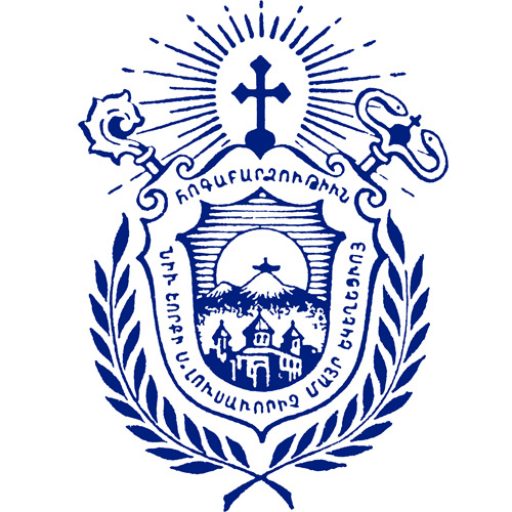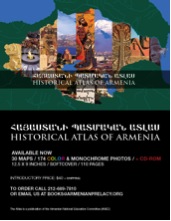
May 16, 2013
On Sunday, May 5, 2013, Dr. Vartan Matiossian, Executive Director of the Armenian National Education Committee (ANEC), presented the recently published “Historical Atlas of Armenia”. The presentation took place in the John Pashalian Hall after the Divine Liturgy. Rev. Fr. Mesrob Lakissian, pastor, introduced the lecturer.
In his illustrated presentation, Dr. Matiossian, editor of the Atlas, referred to the main features of the new publication. He stressed its importance, as a new generation had already come to age since the publication of the first edition in the late 1980s. He reminded the audience that this generation had witnessed the making of history, as two independent Armenian republics (Armenia and Karabakh) were born in the meantime. Dr. Matiossian emphasized the importance of history as a central identity marker for Armenians worldwide, and the use of the Atlas as an educational tool in our schools, which was the main purpose of ANEC when deciding to publish a revised edition of the Atlas. After the presentation, Dr. Matiossian signed copies of the Atlas.
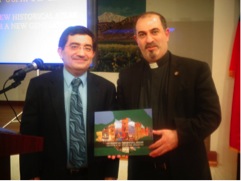
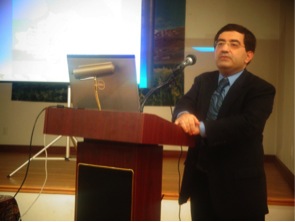

May 16, 2013
The 44th annual competition of Armenian Saturday and Day Schools in New York/New Jersey took place on Saturday, May 4, at the Armenian Center in Woodside, New York. The competition is organized by the literary committee of Hamazkayin of New York. Rev. Fr. Mesrob Lakissian, pastor of St. Illuminator’s Cathedral, guided the competition.
Participating schools included: Holy Martyrs Day and Saturday schools; St. Sarkis Saturday School (Douglaston); and Nareg Saturday School (New Jersey).
Certificates and gifts were given to all participants and additional gifts were presented to those students who answered all questions correctly.
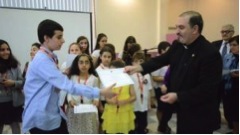
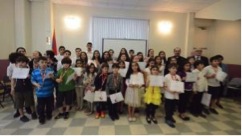
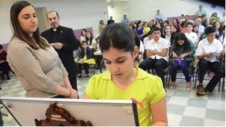
Apr 30, 2013
JOINT STATEMENT
His Holiness Karekin II, Catholicos of All Armenians, Holy See of Etchmiadzin
His Holiness Aram I, Catholicos of Cilicia, Holy See of Cilicia
We Demand Turkey Return Confiscated Armenian Churches and Church Properties
In 2015, Armenians living in the Republics of Armenia and Karabagh and in the Diaspora will commemorate the 100th anniversary of the 1915 Genocide of the Armenian people, planned and executed by Ottoman Turkey.
In 1915, more than one-and-a-half million Armenians were victims of the
Genocide. The survivors of the deportation and exile found refuge in Eastern Armenia (the current Republic of Armenia), Syria, Lebanon, other Arab countries, and various countries around the world.
Armenians living under the Ottoman Empire in Western Armenia, Cilicia and other regions of Turkey, lost all their personal belongings as well as their churches, monasteries, holy sites, religious, educational, and charitable centers, cultural and religious relics and artifacts of great value, including cross-stones, manuscripts, and holy pictures. All of the properties belonging to those massacred and those forcibly deported were usurped by the Turkish government under the pretext of being “abandoned properties.”
Ninety-eight years after the Armenian Genocide, the current Turkish Republic, the legal successors of the Ottoman Empire, not only refuses to acknowledge the well-planned and executed genocide, but continues its anti-Armenian policy, keeping in bondage the Armenian people’s confiscated properties and artifacts, as well as religious and cultural treasures.
Therefore, we send this appeal to the Turkish government with the following demands:
1. Recognition of the Armenian Genocide.
2. Total reparations for Armenian losses in human lives and human rights.
3. The immediate return of churches, monasteries, church properties, and all religious and cultural sites to their rightful and legal owners, the Armenian people.
As we pray for the memory of our victims of the Genocide, we condemn all violent acts against God-given human lives, all assaults on human dignity, and all acts that disrupt peaceful co-existence, because “God is a God not of disorder but of peace,” (I Corinthians 14:33), who invites people to love, to live together, and cooperate in peace and harmony.
We remember with gratitude all those people and governments who during the Genocide sheltered the deported Armenians and showed care and brotherly love toward them.
The Armenian people will always remain grateful to all those governments, who driven by their principles of compassion and justice, have condemned and officially recognized the Armenian Genocide.
On the threshold of the 100th Anniversary commemoration of the Armenian Genocide, we shall work together to achieve the demands of the Armenian people in the name of justice and in defense of the rights of the Armenian people.
April 24, 2013
Karekin II
Catholicos of All Armenians
Etchmidadzin, Armenia
Aram I
Catholicos of Cilicia
Antelias, Lebanon

